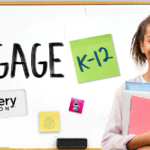Dr. Gregory Firn serves as the Chief Operating Officer for RoboKind. With over 33 years of experience in education, Greg has done everything from teaching to running entire school districts. Greg’s deep experience and passion for helping under-served children has been instrumental in helping RoboKind develop the products and strategies that will successfully serve the K-12 education market.
“It was probably while I was working with Effective Schools and their research that I discovered my passion for underrepresented and historically marginalized kids. While serving as the district superintendent in North Carolina and working with a minority/majority school system with high poverty, I thought, ‘You know what? We can do better! We can create huge differences in the lives of children.’”
From the very beginning, the focus at RoboKind has been to help children with autism learn critical social and behavioral skills and achieve academic success. But even though Milo is the world’s most advanced facially expressive social robot, introducing him into schools and school systems is not easy.
Greg brought to RoboKind an insider’s understanding of the educational system. He also had the skills to create a business plan that would make it possible for RoboKind to successfully launch its products into the K-12 market and grow its foothold in the education market by providing critical insight and direction.
“We have a tremendous opportunity to not only make an impact but to sincerely and authentically change lives.’”
“I’ve witnessed firsthand the impact of the robots4autism program on children. But I’ve also seen its impact on therapists, on teachers, on special educators, and paraprofessionals. And, I’ve seen how the lives of parents and family members have been changed. That’s what this is all about, that’s why I’m here—to change lives.”
Greg’s focus is on positioning RoboKind to be a world leader in the educational market.
What does Robokind do? Perhaps a bit of history…. How long have you been working with schools, students, etc.?
Robokind was established in 2011 with a commitment to provide the highest quality solution for students with autism. Based on “engagement is learning”, we created the most advanced, facially expressive, humanoid robot that engages learners on the spectrum to deliver a “comprehensive social curriculum”
Tell us why Pre-K-12 educators should be aware of what you are doing regarding Educational Equity and Accessibility?
Awareness is the first step towards understanding. If we understand characteristics of autism for example, educators see how robots4autism was designed specifically to meet these unique student needs. This is not only personalized learning but also key to equity of learning and accessibility to academic, workplace, and life skills.
Put your company into the realm of Equity in education. We know you care and always have. Too many companies simply say the word and do nothing else.
In context, equity is providing the necessary, essential, and required resources – not equal resources but resources albeit staffing, programming, or time. Though it sounds trite almost pithy, but equity is whatever it takes to ensure that each learner has authentic access and opportunity to learn and learn successfully. Without a commitment to equity, access and opportunity will continue to be nonauthentic and beyond the reach of many.
What are you most proud of about Robokind in today’s educational world?
We change lives! I am very pleased that what we do goes beyond providing quality products and services. I am humbled daily by the breakthroughs educators and parents share about how Milo and the robots4autism program creates life changing experiences.
School districts are very concerned about Equity for all students. We know you are too. How has this changed the way you work with school districts?
I am in a unique situation as I have the advantage of serving over 30 years in public education. This can also be a liability. When I hear “equity for all students” I immediately want to shout, “it’s not all, it’s each” student.
The word “each” is personal and in many cases puts a face on students. This is what we do at RoboKind. We speak to the impact that each student experiences knowing that each student will have a slightly different experience. To us, this is how we begin the conversation of authentically personalizing the learning experience. There’s a lot of noise about personalizing learning. Yet, if we are going to talk about equity we must talk about personalizing learning to ensure we are meeting the needs of each student.
Ed tech makes a big difference out there in terms of Accessibility. Put Robokind into that area.
Accessibility is central to our work. It’s more about how we create accessibility not whether or not our products are accessible. We create accessibility through empowering each learner with foundational skills, knowledge and experiences. For students with autism, our robots4autism program creates accessibility through establishing a foundation in self-regulation, social and emotional understanding, and conversational dynamics. Accessibility to learning, life, family, community, and often employment are made possible through mastering the aforementioned skill sets.
Accessibility and equity also affects educators. The best teaching happens when teachers have up to date materials and/or technology. What are your thoughts on this?
We must first start with defining accessibility and equity in the context of teaching and learning. As a culture we confuse both terms and layer them with cultural bias. For example, equity is not equal. In education, equity is matching resources with needs – not treating each student, educator, or school for the matter the same. It was Dr. Larry Lezotte who I remember first saying “the bane of our existence is sameness”. In a like manner, accessibility is also hampered by “sameness”. We tend to define accessibility by our own experiences which is inherently limiting. Our work, my work is helping others, sometimes challenging others, to think differently about how we can meet the needs of those who are different than ourselves. Diversity is good and we must embrace it not fear it.
The American Consortium for Equity in Education, publisher of the "Equity & Access" journal, celebrates and connects the educators, associations, community partners and industry leaders who are working to solve problems and create a more equitable environment for historically underserved pre K-12 students throughout the United States.
- American Consortium for Equity in Educationhttps://ace-ed.org/author/admin/
- American Consortium for Equity in Educationhttps://ace-ed.org/author/admin/April 23, 2025
- American Consortium for Equity in Educationhttps://ace-ed.org/author/admin/
- American Consortium for Equity in Educationhttps://ace-ed.org/author/admin/







